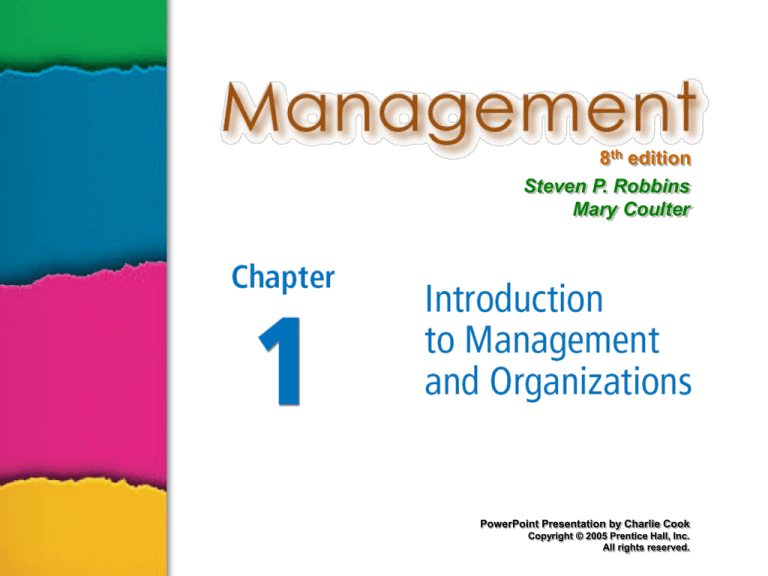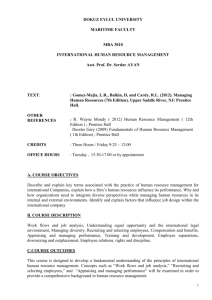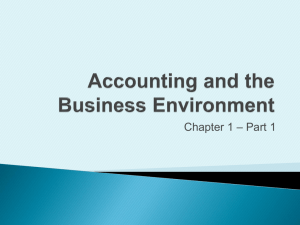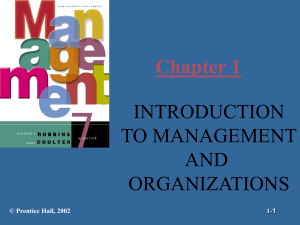
8th edition
Steven P. Robbins
Mary Coulter
PowerPoint Presentation by Charlie Cook
Copyright © 2005 Prentice Hall, Inc.
All rights reserved.
LEARNING OUTLINE
Follow this Learning Outline as you read and study this chapter.
Who Are Managers?
• Describe who is doing managerial work in
today’s organizations.
• Define who managers are.
• Explain how manager differ from nonmanagerial employees.
• Discuss how to classify managers in
organizations.
Copyright © 2005 Prentice Hall, Inc. All rights reserved.
1–2
L E A R N I N G O U T L I N E (cont’d)
Follow this Learning Outline as you read and study this chapter.
What Is Management?
• Define management.
• Contrast efficiency and effectiveness.
• Explain why efficiency and effectiveness are
important to management.
Copyright © 2005 Prentice Hall, Inc. All rights reserved.
1–3
L E A R N I N G O U T L I N E (cont’d)
Follow this Learning Outline as you read and study this chapter.
What Do Managers Do?
• Describe the four functions of management.
• Explain Mintzberg’s managerial roles.
• Tell how a manager’s include reflection and action.
• Describe Katz’s three essential managerial skills and how
the importance of these skills changes depending on
managerial level.
• List other important managerial skills and competencies.
• Discuss the change that are impacting managers’ jobs.
• Explain why customer service and innovation are
important to the manager’s job.
Copyright © 2005 Prentice Hall, Inc. All rights reserved.
1–4
L E A R N I N G O U T L I N E (cont’d)
Follow this Learning Outline as you read and study this chapter.
What Is An Organization?
• Describe the characteristics of an organization.
• Explain how the concept of an organization is
changing.
Copyright © 2005 Prentice Hall, Inc. All rights reserved.
1–5
L E A R N I N G O U T L I N E (cont’d)
Follow this Learning Outline as you read and study this chapter.
Why Study Management?
• Explain the universality of management
concept.
• Discuss why an understanding of management
is important even if you don’t plan to be a
manager.
• Describe the rewards and challenges of being a
manager.
Copyright © 2005 Prentice Hall, Inc. All rights reserved.
1–6
Who Are Managers?
• Manager
Someone who works with and through other people
by coordinating and integrating their work activities in
order to accomplish organizational goals.
Copyright © 2005 Prentice Hall, Inc. All rights reserved.
1–7
Classifying Managers
• First-line Managers
Managers at the lowest level of the organization who
manage the work of non-managerial employees who
involved with the production or creation of the
organization’s products.
Copyright © 2005 Prentice Hall, Inc. All rights reserved.
1–8
Classifying Managers
(cont’d)
• Middle Managers
Managers between the first-line level and the top level
of the organization who manage the work of first-line
managers.
Copyright © 2005 Prentice Hall, Inc. All rights reserved.
1–9
Classifying Managers
(cont’d)
• Top Managers
Managers at or near the top level of the organization
who are responsible for making organization-wide
decisions and establishing the goals and plans that
affect the entire organization.
Copyright © 2005 Prentice Hall, Inc. All rights reserved.
1–10







